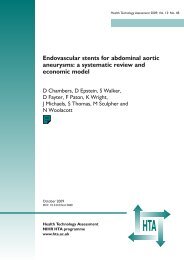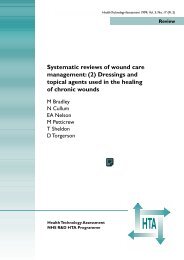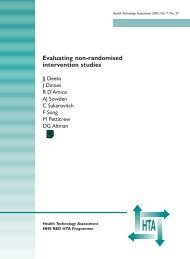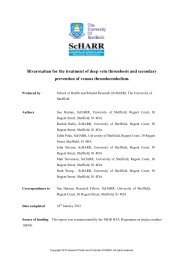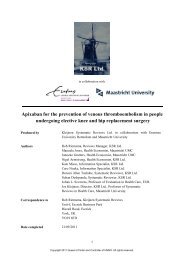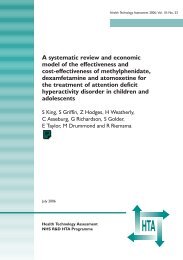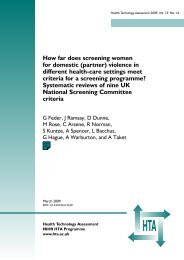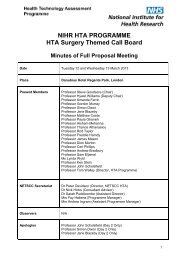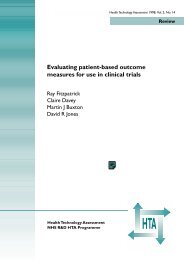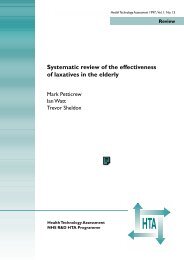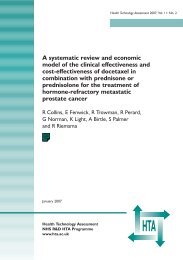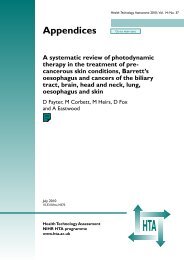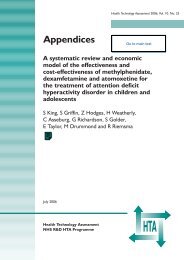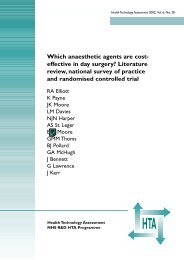Donepezil, rivastigmine, galantamine and memantine for ...
Donepezil, rivastigmine, galantamine and memantine for ...
Donepezil, rivastigmine, galantamine and memantine for ...
Create successful ePaper yourself
Turn your PDF publications into a flip-book with our unique Google optimized e-Paper software.
146<br />
Discussion <strong>and</strong> conclusions<br />
dose–response relationship. A number of issues<br />
<strong>and</strong> methodological concerns which may have<br />
some bearing on the interpretation of this<br />
evidence are discussed below.<br />
The results of the present review show the same<br />
trends as noted in previously published systematic<br />
reviews.<br />
Direct comparisons between cholinesterase<br />
inhibitors<br />
When directly compared with donepezil in two<br />
trials, treatment with <strong>rivastigmine</strong> showed no<br />
statistically significant differences on measures of<br />
cognition or function.<br />
In a study directly comparing donepezil with<br />
<strong>galantamine</strong>, both treatments showed<br />
improvement on measures of cognition <strong>and</strong><br />
function. The improvement with donepezil was<br />
shown to be greater however, <strong>and</strong> adverse events<br />
were shown to be more common in the<br />
<strong>galantamine</strong> patients.<br />
Efficacy in interventions <strong>for</strong> moderately<br />
severe to severe AD<br />
Memantine<br />
Two RCTs of good methodological quality were<br />
included in the review. In these studies different<br />
participant groups were used; in one study<br />
participants were already receiving donepezil.<br />
Both studies were of a relatively short duration of<br />
approximately 6 months. Memantine shows<br />
beneficial effects in participants with moderately<br />
severe to severe AD in terms of functional <strong>and</strong><br />
global measurements, where participants in the<br />
treatment arms show less deterioration than those<br />
in the placebo arm. The effect of <strong>memantine</strong> on<br />
cognitive outcome measurements is also<br />
favourable, although this was not always<br />
statistically significant. On measures of behaviour<br />
<strong>and</strong> mood, <strong>memantine</strong> was only beneficial in the<br />
groups already receiving donepezil. There was a<br />
tendency <strong>for</strong> more adverse events with treatment<br />
with <strong>memantine</strong>, but withdrawals due to adverse<br />
events tended to be greater in the placebo groups.<br />
Overall, the results suggest that <strong>memantine</strong> may<br />
be more effective in patients who are already<br />
receiving <strong>and</strong> continue to receive donepezil, but<br />
this is tentatively based on one trial only. A<br />
number of issues <strong>and</strong> methodological concerns<br />
which may have some bearing on the<br />
interpretation of this evidence are discussed below.<br />
The results of the present review show the same<br />
trends as noted in previously published systematic<br />
reviews.<br />
Cost-effectiveness<br />
Cost-effectiveness <strong>for</strong> treatment of mild<br />
to moderately severe AD<br />
Cost-effectiveness of donepezil<br />
Nine published economic evaluations of donepezil<br />
<strong>and</strong> the industry submission have been reviewed,<br />
together with a summary of two published<br />
abstracts. Except <strong>for</strong> those by Stein <strong>and</strong> the<br />
AD2000 collaborative group, these studies are<br />
regarded as industry sponsored (either fully or in<br />
part). Studies have presented a variety of<br />
conclusions regarding the cost-effectiveness of<br />
donepezil, with donepezil as cost saving, cost<br />
neutral or cost incurring; however all studies<br />
present donepezil as having a beneficial effect on<br />
cognitive function. The wide range of results seen<br />
in the literature is perhaps not surprising given<br />
the diverse country settings, variations in the<br />
perspective of the studies <strong>and</strong> differences in the<br />
types of resources that were included in the cost<br />
estimates, <strong>and</strong> also the differences in the way in<br />
which the models used were constructed.<br />
The international literature is not helpful in the<br />
context of a UK analysis, given the societal<br />
perspective often employed, <strong>and</strong> the cost<br />
structures used <strong>for</strong> cost-effectiveness analysis in a<br />
non-UK setting. Where UK-specific analysis is<br />
seen, the simple study by Stein suggests that<br />
donepezil is not cost-effective <strong>and</strong> Stewart <strong>and</strong><br />
colleagues discuss an incremental cost of between<br />
£1200 <strong>and</strong> £7000 per year in a non-severe AD<br />
health state. When considering the findings from<br />
Stewart <strong>and</strong> colleagues, it is important to note that<br />
it is the difference in QoL between severe <strong>and</strong><br />
non-severe, <strong>for</strong> example in the context of a QALY,<br />
that is pertinent <strong>for</strong> cost-effectiveness, that is, how<br />
does the patient/society value the endpoint. The<br />
industry submission suggests a base-case cost per<br />
year in a non-severe state of £1206, with results<br />
presented with half-cycle correction <strong>and</strong> using<br />
probabilistic analysis suggesting the cost per year<br />
of non-severe AD to be £10,826. However, given<br />
the issues discussed above, it would appear<br />
reasonable in the context of the sensitivity analysis<br />
presented to conceive of a cost per QALY well in<br />
excess of £40,000–50,000 (with this estimate also<br />
based on potentially optimistic effectiveness data).<br />
Cost-effectiveness analysis by SHTAC, using the<br />
cost-effectiveness model described above, suggests<br />
that donepezil treatment has a cost per QALY in<br />
excess of £80,000 per QALY.<br />
Cost-effectiveness of <strong>rivastigmine</strong><br />
Four published economic evaluations reporting on



